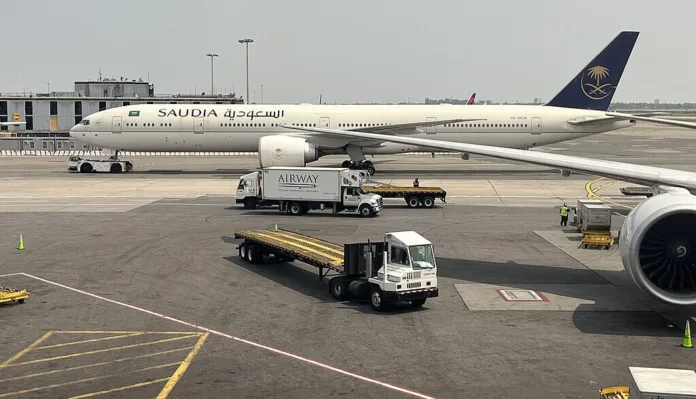Saudi Arabia logistics hub: Strategic partnerships and tech-driven initiatives at King Salman International Airport aim to position the Kingdom as a leading logistics and e-commerce centre
Saudi Arabia is accelerating its ambition to become a global logistics hub by 2030 through a series of strategic investments and partnerships, focusing on advanced technology and operational excellence in the sector. As part of its broader Vision 2030 initiative, the Kingdom is strengthening its logistics infrastructure to solidify its position as a central link between Asia, Europe, and Africa.
At the forefront of these efforts is King Salman International Airport Development Co. (KSIADC), a company owned by the Saudi sovereign wealth fund, the Public Investment Fund (PIF). On 13 October 2024, KSIADC announced a significant agreement with ewpartners, a firm that specialises in private investment, strategic alliances, and asset initiatives. This partnership is poised to play a vital role in transforming the Kingdom’s logistics landscape, with the aim of making Saudi Arabia a key player in the global logistics and e-commerce sectors.
The collaboration will focus on developing a logistics hub at King Salman International Airport, a strategic initiative that is central to Saudi Arabia’s National Transport and Logistics Strategy. The new logistics centre will enhance distribution management, particularly between China and Saudi Arabia, capitalising on the Kingdom’s geographic position as a gateway connecting three continents. According to the Saudi Press Agency (SPA), this centre is expected to elevate Saudi Arabia’s air freight capabilities and significantly boost the efficiency of regional and international distribution networks.
Embed from Getty ImagesMarco Mejia, the acting CEO of KSIADC, expressed optimism about the impact of the partnership on the Kingdom’s logistics infrastructure. “This partnership is a major step towards realising our vision of making King Salman International Airport a primary logistics centre for regional and global companies. It supports the Kingdom’s growing trade footprint and will increase operational efficiency in logistics,” Mejia stated.
The agreement not only aims to improve physical infrastructure but also seeks to modernise digital services and manufacturing capabilities, key areas that are expected to drive the future of logistics. By incorporating advanced technology and streamlining operations, the partnership is set to create new opportunities for economic growth both within Saudi Arabia and across the region.
In addition to these advancements, the deal will explore the establishment of an economic hub for e-commerce and distribution at the airport, further reinforcing the Kingdom’s goal of becoming a global logistics powerhouse. The centre will improve supply chains and promote trade, aligning with the objectives laid out in the Saudi Vision 2030 roadmap.
Jerry Li, founder and managing partner of ewpartners, highlighted the significance of King Salman International Airport’s strategic location and commercial potential. “The airport’s position, combined with its vast regional commercial capabilities, presents numerous avenues for growth and innovation in the logistics and e-commerce sectors,” Li remarked. This strategic partnership, he noted, will unlock new possibilities for technological advancement and infrastructure development, ensuring that Saudi Arabia remains competitive on the global stage.
Saudi Arabia’s ambitions in the logistics sector are closely tied to its broader goals for economic diversification under Vision 2030, which seeks to reduce the Kingdom’s reliance on oil revenue by expanding into other sectors such as technology, transport, and e-commerce. The logistics industry, which is currently undergoing a significant transformation worldwide, is a key focus area, with countries like Saudi Arabia positioning themselves to capture a larger share of global trade flows.
Abdullah Al-Dubaikhi, assistant minister at the Ministry of Investment, also commented on the Kingdom’s plans during the Global Logistics Forum held in Riyadh. He emphasised the government’s commitment to preparing a workforce capable of navigating the rapid technological advancements within the logistics sector. By investing in human capital and fostering innovation, Saudi Arabia aims to build a robust and future-ready logistics industry.
The rapid development of logistics infrastructure is set to not only attract global companies but also enhance the Kingdom’s regional influence as a major player in global supply chains. With initiatives like the King Salman International Airport logistics hub and partnerships with firms such as ewpartners, Saudi Arabia is well on its way to achieving its ambitious goals by 2030.
The strategic significance of the Kingdom’s location has long been recognised, and with the ongoing enhancements in air freight, seaports, and overland transport systems, Saudi Arabia is steadily positioning itself as the logistics gateway for three continents. The initiatives undertaken in the coming years, coupled with the integration of cutting-edge technology, are expected to place Saudi Arabia at the heart of global trade.
As the Kingdom continues to push forward with its Vision 2030 agenda, it is clear that the logistics sector will play a pivotal role in shaping its future economic landscape. Through strategic partnerships, investment in innovation, and a strong focus on sustainability, Saudi Arabia is building the foundations for long-term success in the global logistics arena.
